Case Study on Agilent Technologies: Organizational Change
VerifiedAdded on 2023/06/17
|8
|670
|126
AI Summary
This case study analyzes the organizational change in Agilent Technologies, identifying the main problem and sub-problems, setting a new vision, objectives with KPI, strategic options, and implementation plan.
Contribute Materials
Your contribution can guide someone’s learning journey. Share your
documents today.
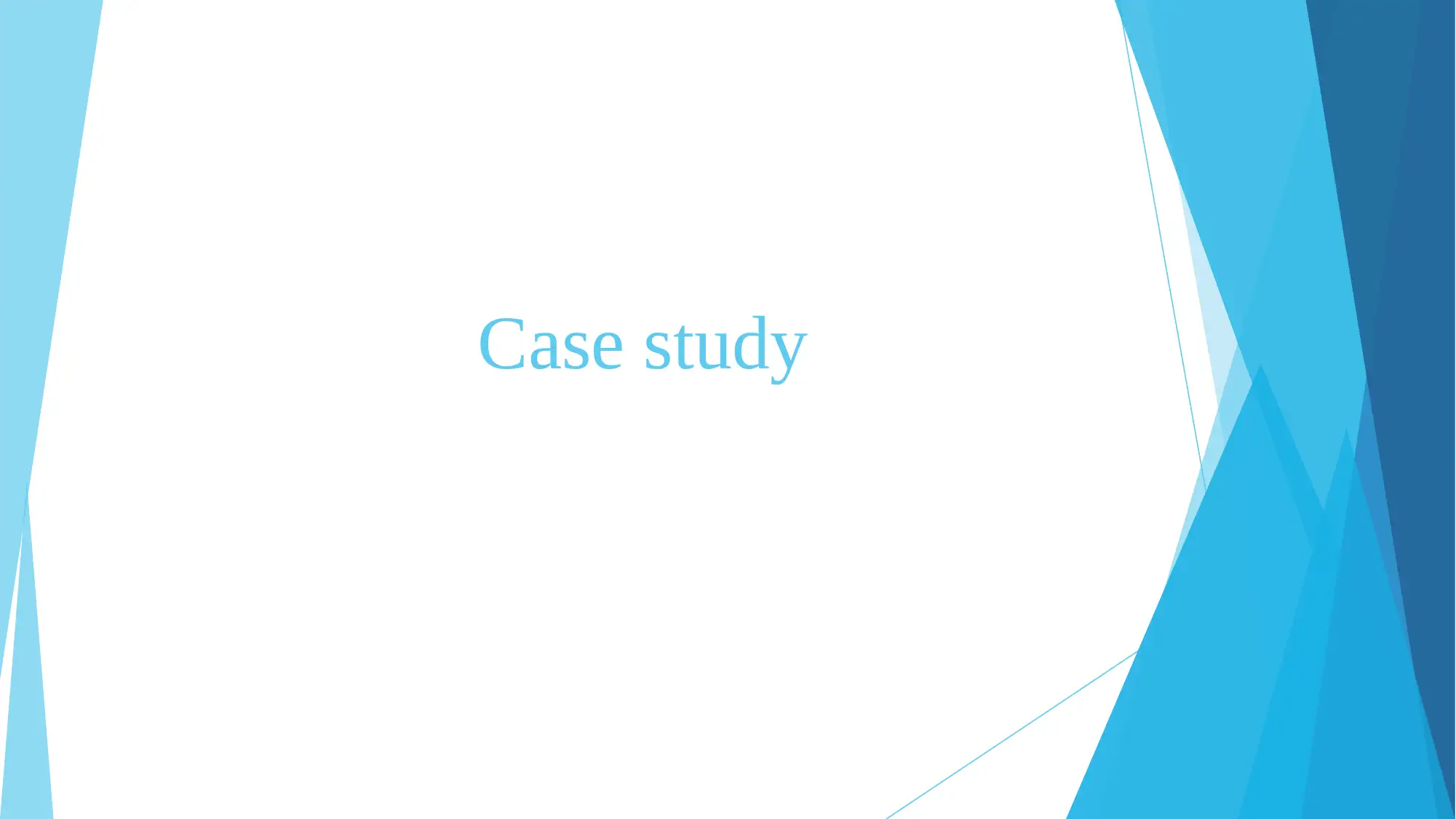
Case study
Secure Best Marks with AI Grader
Need help grading? Try our AI Grader for instant feedback on your assignments.
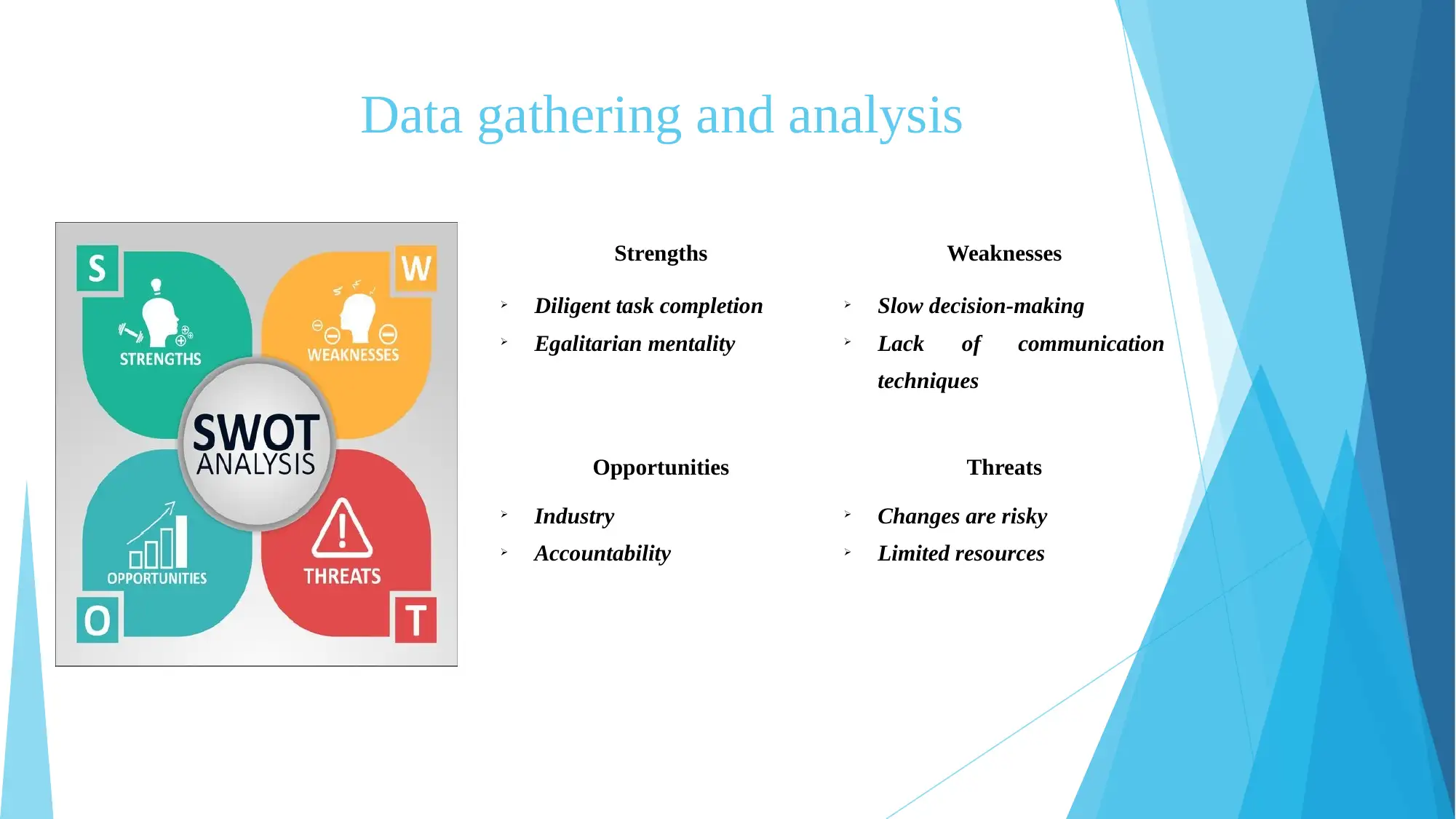
Data gathering and analysis
Strengths Weaknesses
Diligent task completion
Egalitarian mentality
Slow decision-making
Lack of communication
techniques
Opportunities Threats
Industry
Accountability
Changes are risky
Limited resources
Strengths Weaknesses
Diligent task completion
Egalitarian mentality
Slow decision-making
Lack of communication
techniques
Opportunities Threats
Industry
Accountability
Changes are risky
Limited resources
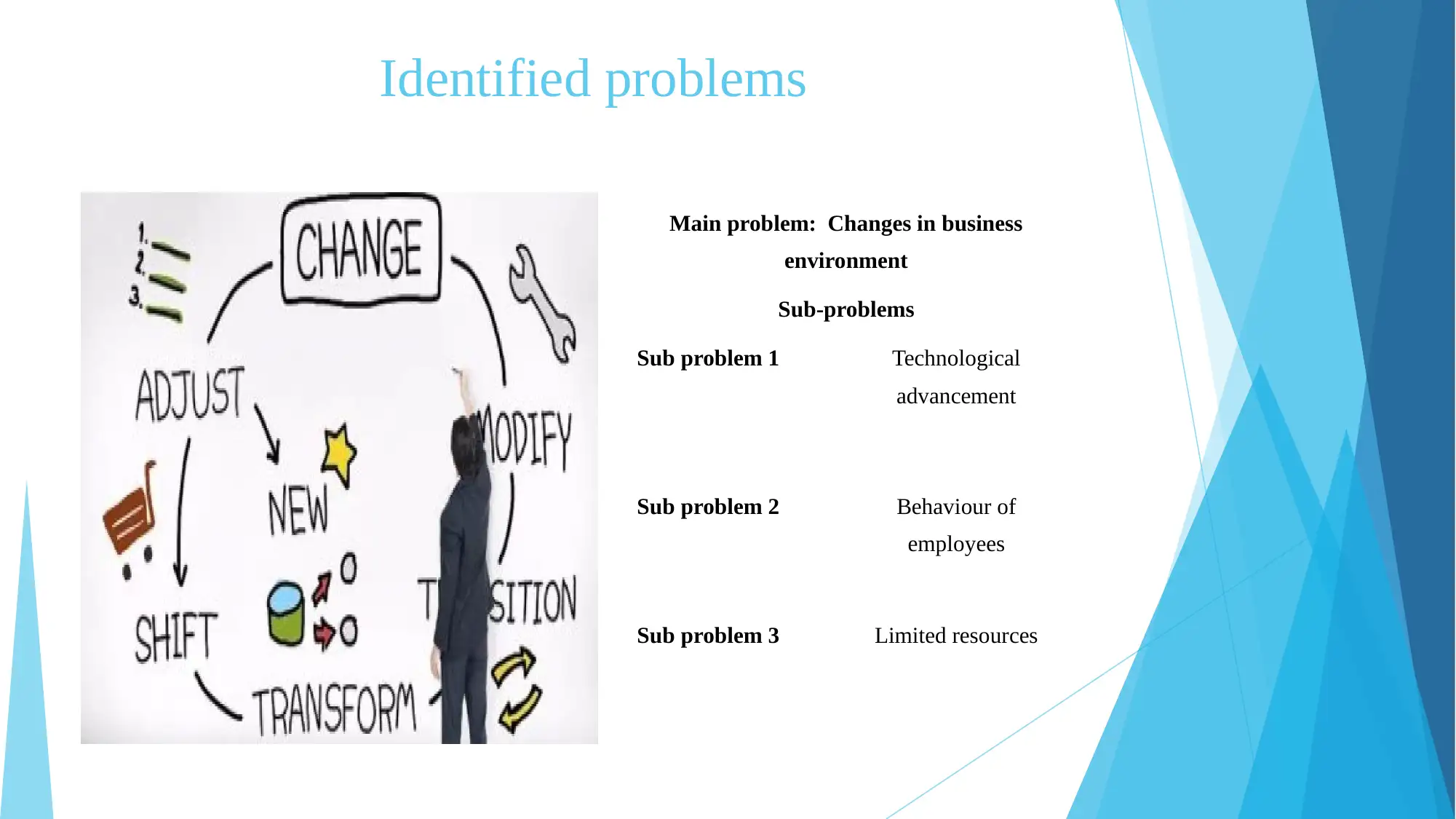
Identified problems
Main problem: Changes in business
environment
Sub-problems
Sub problem 1 Technological
advancement
Sub problem 2 Behaviour of
employees
Sub problem 3 Limited resources
Main problem: Changes in business
environment
Sub-problems
Sub problem 1 Technological
advancement
Sub problem 2 Behaviour of
employees
Sub problem 3 Limited resources
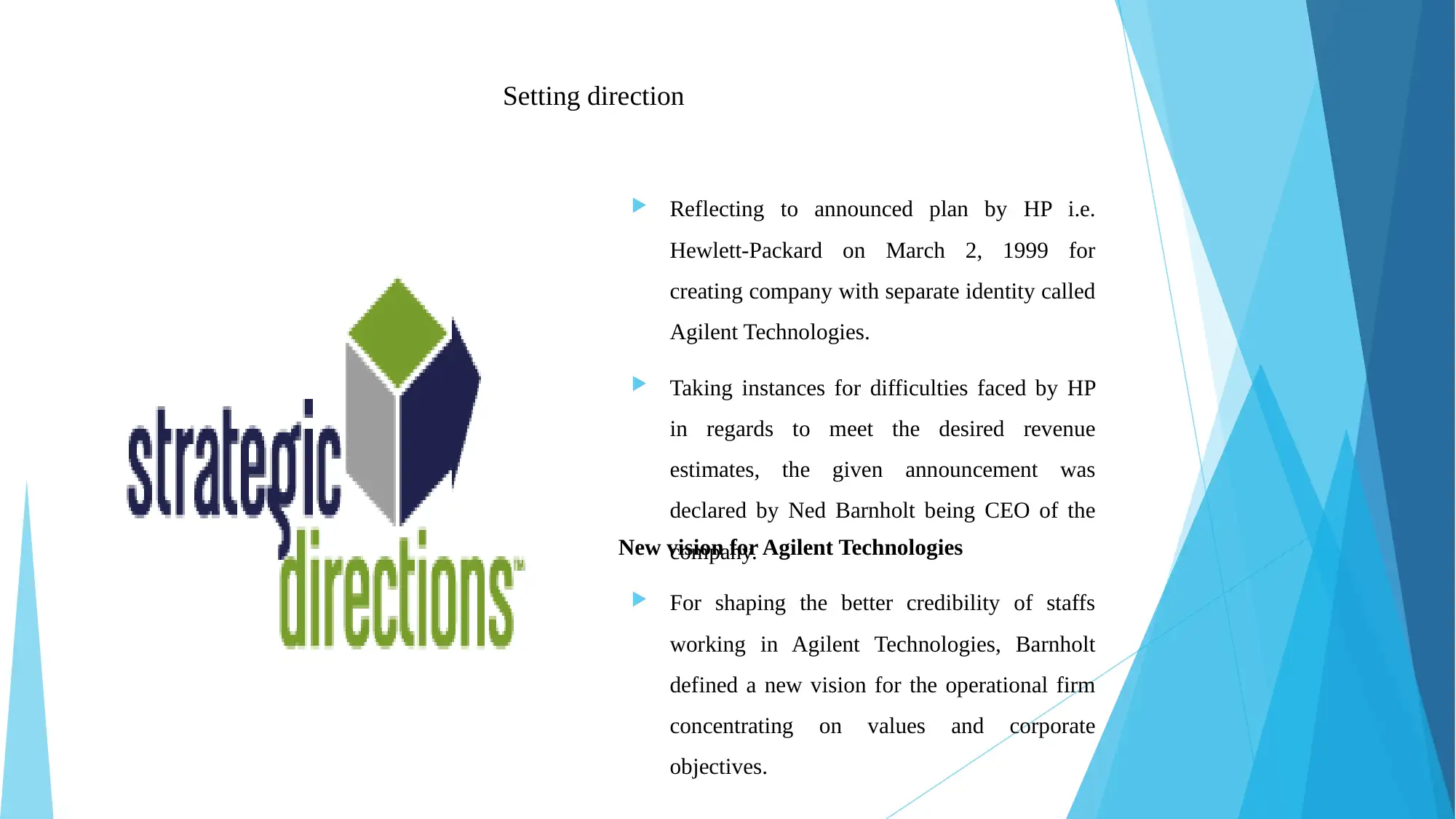
Setting direction
Reflecting to announced plan by HP i.e.
Hewlett-Packard on March 2, 1999 for
creating company with separate identity called
Agilent Technologies.
Taking instances for difficulties faced by HP
in regards to meet the desired revenue
estimates, the given announcement was
declared by Ned Barnholt being CEO of the
company.New vision for Agilent Technologies
For shaping the better credibility of staffs
working in Agilent Technologies, Barnholt
defined a new vision for the operational firm
concentrating on values and corporate
objectives.
Reflecting to announced plan by HP i.e.
Hewlett-Packard on March 2, 1999 for
creating company with separate identity called
Agilent Technologies.
Taking instances for difficulties faced by HP
in regards to meet the desired revenue
estimates, the given announcement was
declared by Ned Barnholt being CEO of the
company.New vision for Agilent Technologies
For shaping the better credibility of staffs
working in Agilent Technologies, Barnholt
defined a new vision for the operational firm
concentrating on values and corporate
objectives.
Secure Best Marks with AI Grader
Need help grading? Try our AI Grader for instant feedback on your assignments.
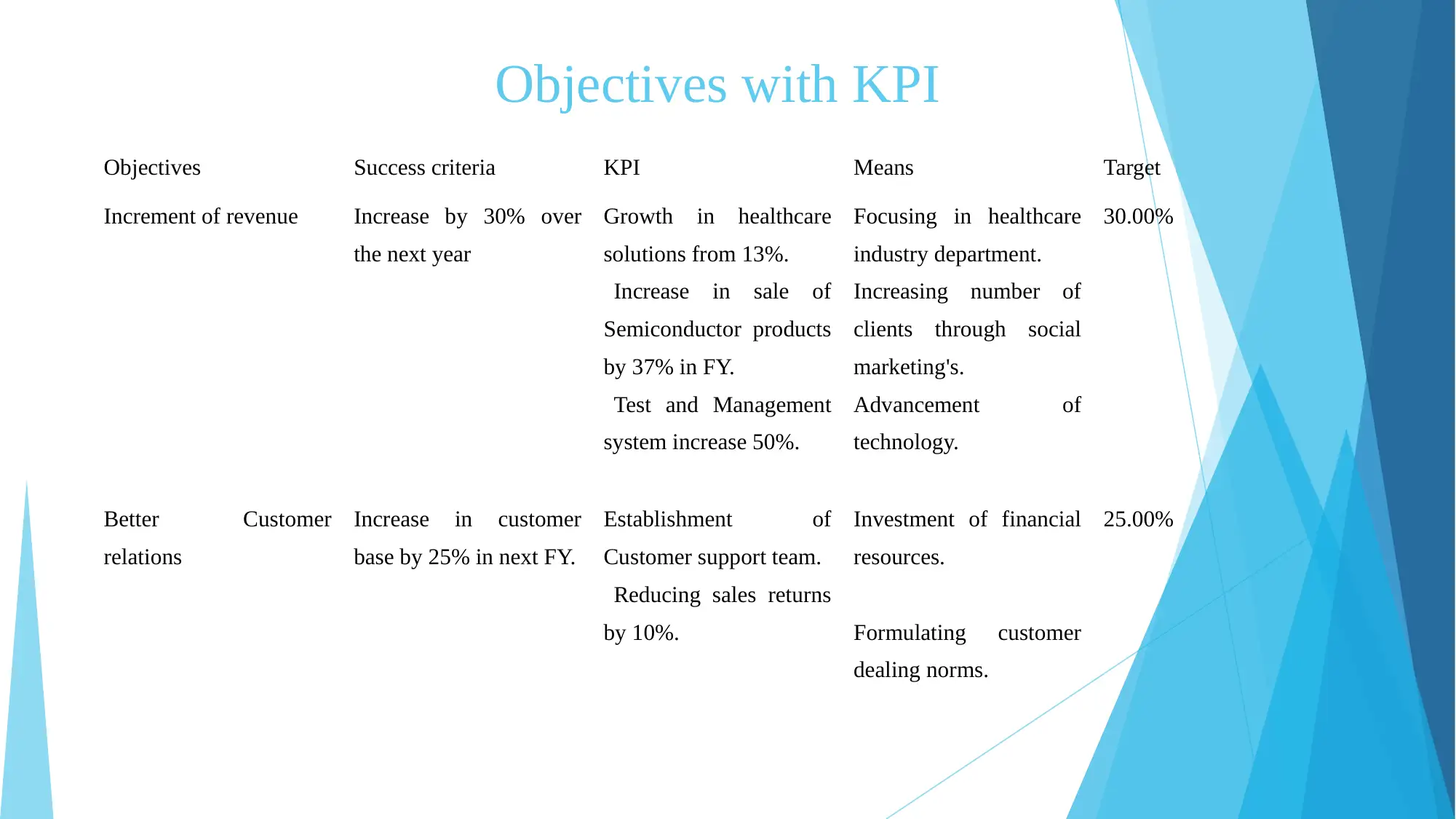
Objectives with KPI
Objectives Success criteria KPI Means Target
Increment of revenue Increase by 30% over
the next year
Growth in healthcare
solutions from 13%.
Increase in sale of
Semiconductor products
by 37% in FY.
Test and Management
system increase 50%.
Focusing in healthcare
industry department.
Increasing number of
clients through social
marketing's.
Advancement of
technology.
30.00%
Better Customer
relations
Increase in customer
base by 25% in next FY.
Establishment of
Customer support team.
Reducing sales returns
by 10%.
Investment of financial
resources.
Formulating customer
dealing norms.
25.00%
Objectives Success criteria KPI Means Target
Increment of revenue Increase by 30% over
the next year
Growth in healthcare
solutions from 13%.
Increase in sale of
Semiconductor products
by 37% in FY.
Test and Management
system increase 50%.
Focusing in healthcare
industry department.
Increasing number of
clients through social
marketing's.
Advancement of
technology.
30.00%
Better Customer
relations
Increase in customer
base by 25% in next FY.
Establishment of
Customer support team.
Reducing sales returns
by 10%.
Investment of financial
resources.
Formulating customer
dealing norms.
25.00%
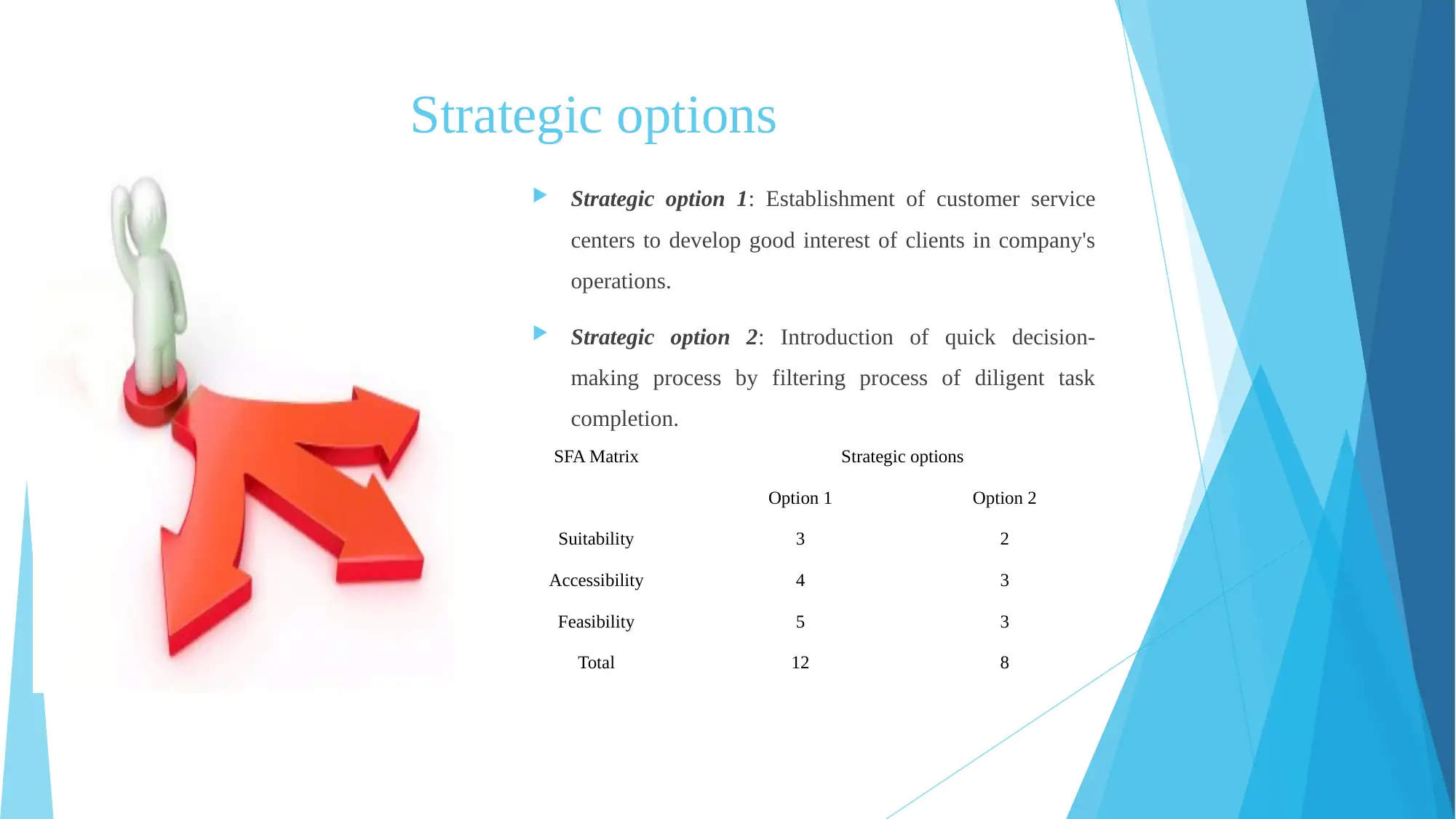
Strategic options
Strategic option 1: Establishment of customer service
centers to develop good interest of clients in company's
operations.
Strategic option 2: Introduction of quick decision-
making process by filtering process of diligent task
completion.
SFA Matrix Strategic options
Option 1 Option 2
Suitability 3 2
Accessibility 4 3
Feasibility 5 3
Total 12 8
Strategic option 1: Establishment of customer service
centers to develop good interest of clients in company's
operations.
Strategic option 2: Introduction of quick decision-
making process by filtering process of diligent task
completion.
SFA Matrix Strategic options
Option 1 Option 2
Suitability 3 2
Accessibility 4 3
Feasibility 5 3
Total 12 8
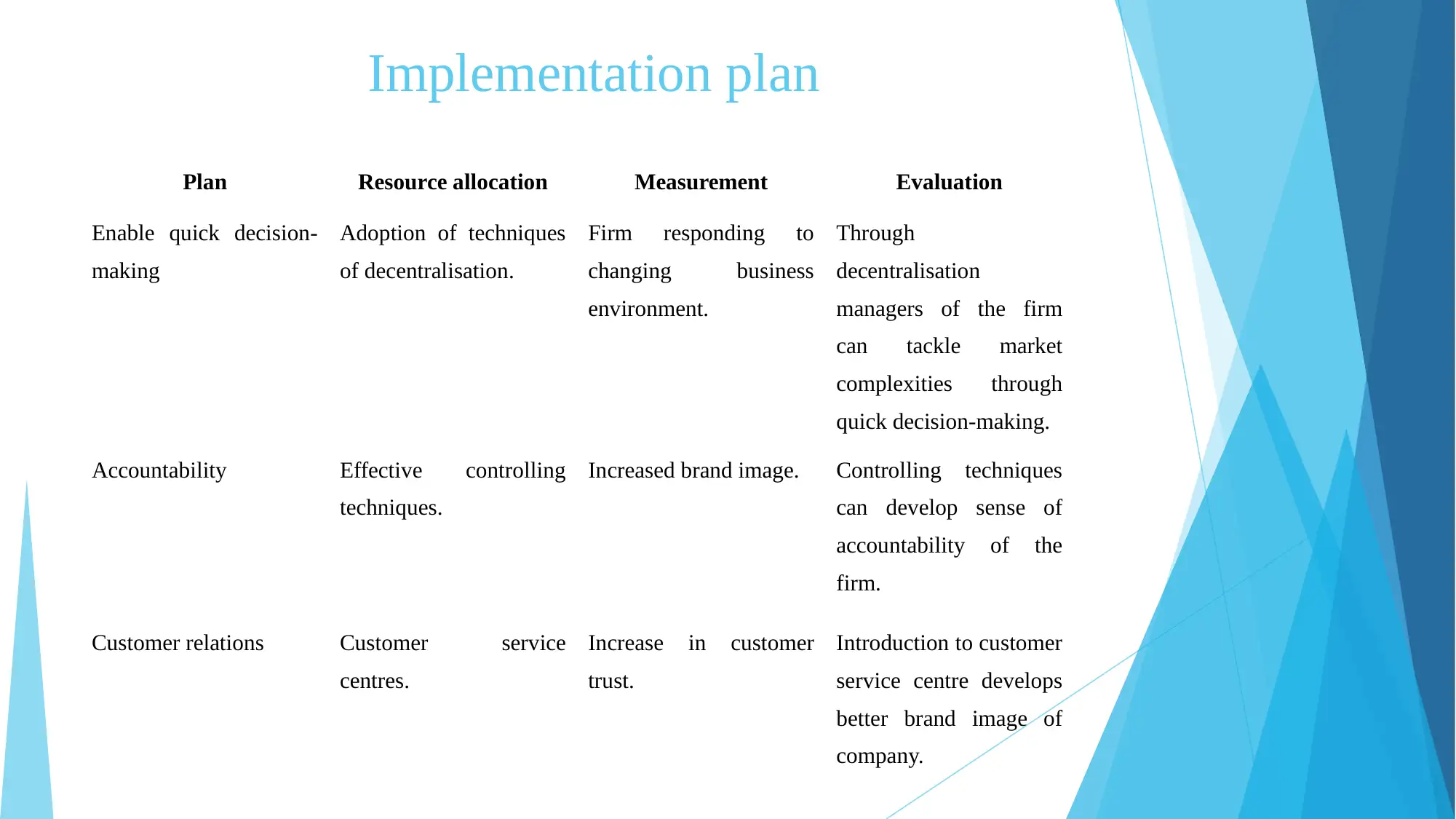
Implementation plan
Plan Resource allocation Measurement Evaluation
Enable quick decision-
making
Adoption of techniques
of decentralisation.
Firm responding to
changing business
environment.
Through
decentralisation
managers of the firm
can tackle market
complexities through
quick decision-making.
Accountability Effective controlling
techniques.
Increased brand image. Controlling techniques
can develop sense of
accountability of the
firm.
Customer relations Customer service
centres.
Increase in customer
trust.
Introduction to customer
service centre develops
better brand image of
company.
Plan Resource allocation Measurement Evaluation
Enable quick decision-
making
Adoption of techniques
of decentralisation.
Firm responding to
changing business
environment.
Through
decentralisation
managers of the firm
can tackle market
complexities through
quick decision-making.
Accountability Effective controlling
techniques.
Increased brand image. Controlling techniques
can develop sense of
accountability of the
firm.
Customer relations Customer service
centres.
Increase in customer
trust.
Introduction to customer
service centre develops
better brand image of
company.
Paraphrase This Document
Need a fresh take? Get an instant paraphrase of this document with our AI Paraphraser
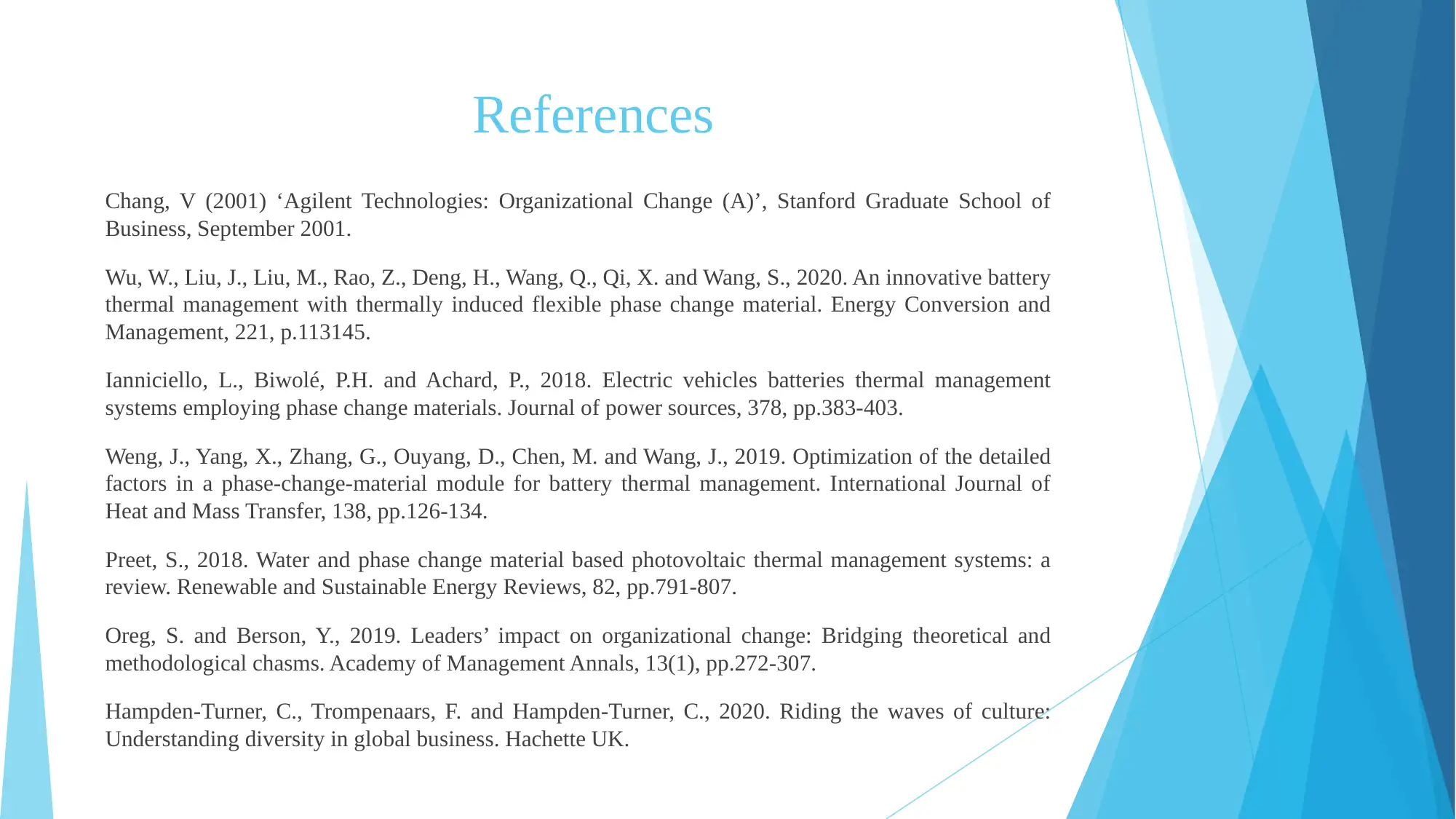
References
Chang, V (2001) ‘Agilent Technologies: Organizational Change (A)’, Stanford Graduate School of
Business, September 2001.
Wu, W., Liu, J., Liu, M., Rao, Z., Deng, H., Wang, Q., Qi, X. and Wang, S., 2020. An innovative battery
thermal management with thermally induced flexible phase change material. Energy Conversion and
Management, 221, p.113145.
Ianniciello, L., Biwolé, P.H. and Achard, P., 2018. Electric vehicles batteries thermal management
systems employing phase change materials. Journal of power sources, 378, pp.383-403.
Weng, J., Yang, X., Zhang, G., Ouyang, D., Chen, M. and Wang, J., 2019. Optimization of the detailed
factors in a phase-change-material module for battery thermal management. International Journal of
Heat and Mass Transfer, 138, pp.126-134.
Preet, S., 2018. Water and phase change material based photovoltaic thermal management systems: a
review. Renewable and Sustainable Energy Reviews, 82, pp.791-807.
Oreg, S. and Berson, Y., 2019. Leaders’ impact on organizational change: Bridging theoretical and
methodological chasms. Academy of Management Annals, 13(1), pp.272-307.
Hampden-Turner, C., Trompenaars, F. and Hampden-Turner, C., 2020. Riding the waves of culture:
Understanding diversity in global business. Hachette UK.
Chang, V (2001) ‘Agilent Technologies: Organizational Change (A)’, Stanford Graduate School of
Business, September 2001.
Wu, W., Liu, J., Liu, M., Rao, Z., Deng, H., Wang, Q., Qi, X. and Wang, S., 2020. An innovative battery
thermal management with thermally induced flexible phase change material. Energy Conversion and
Management, 221, p.113145.
Ianniciello, L., Biwolé, P.H. and Achard, P., 2018. Electric vehicles batteries thermal management
systems employing phase change materials. Journal of power sources, 378, pp.383-403.
Weng, J., Yang, X., Zhang, G., Ouyang, D., Chen, M. and Wang, J., 2019. Optimization of the detailed
factors in a phase-change-material module for battery thermal management. International Journal of
Heat and Mass Transfer, 138, pp.126-134.
Preet, S., 2018. Water and phase change material based photovoltaic thermal management systems: a
review. Renewable and Sustainable Energy Reviews, 82, pp.791-807.
Oreg, S. and Berson, Y., 2019. Leaders’ impact on organizational change: Bridging theoretical and
methodological chasms. Academy of Management Annals, 13(1), pp.272-307.
Hampden-Turner, C., Trompenaars, F. and Hampden-Turner, C., 2020. Riding the waves of culture:
Understanding diversity in global business. Hachette UK.
1 out of 8
Your All-in-One AI-Powered Toolkit for Academic Success.
+13062052269
info@desklib.com
Available 24*7 on WhatsApp / Email
![[object Object]](/_next/static/media/star-bottom.7253800d.svg)
Unlock your academic potential
© 2024 | Zucol Services PVT LTD | All rights reserved.